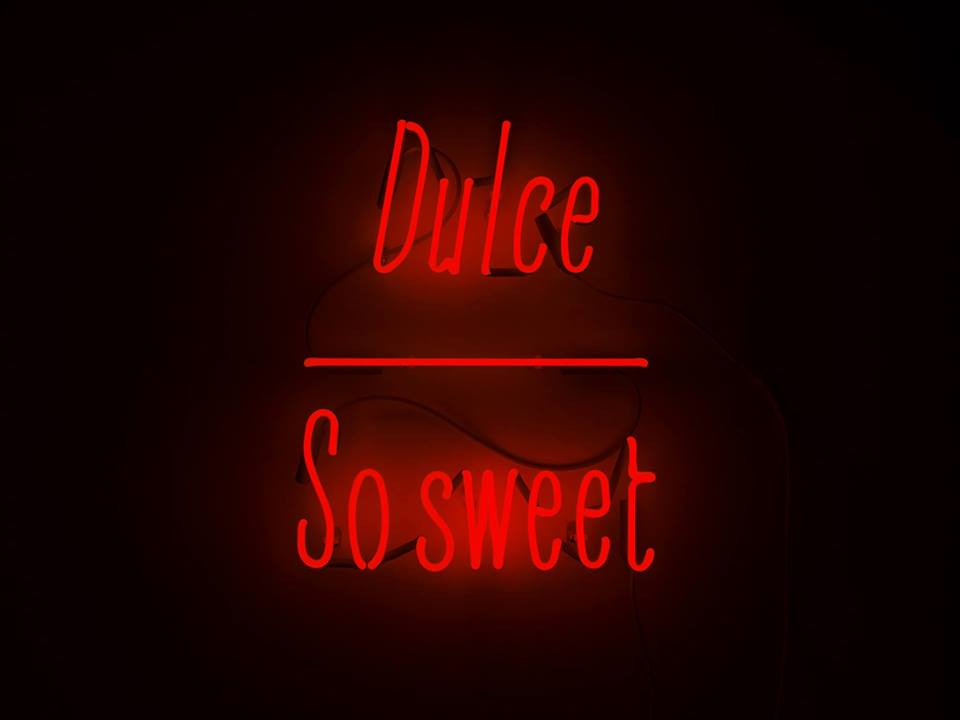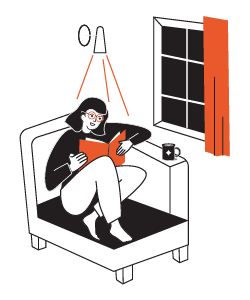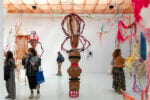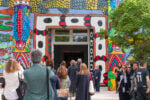Joseph Kosuth – Maxima Proposito (Ovidio)

La nuova mostra di Joseph Kosuth alla galleria Vistamare di Pescara è basata sul lavoro di Ovidio. Questa è la prima volta che l’artista si confronta con il poeta romano, nato a Sulmona vicino Pescara, e contemporaneo di Orazio e Virgilio. Kosuth si appropria di una serie di testi di Ovidio scritti durante il regno d’Augusto, apogeo della civiltà romana, un’epoca colta, cosmopolita e sofisticata.
Comunicato stampa
La nuova mostra di Joseph Kosuth alla galleria Vistamare di Pescara è basata sul lavoro di Ovidio. Questa è la prima volta che l’artista si confronta con il poeta romano, nato a Sulmona vicino Pescara, e contemporaneo di Orazio e Virgilio. Kosuth si appropria di una serie di testi di Ovidio scritti durante il regno d’Augusto, apogeo della civiltà romana, un’epoca colta, cosmopolita e sofisticata.
L’artista presenta una selezione di scritti in inglese e in latino che costituiscono assieme un’istallazione site-specific che percorre le quattro stanze della galleria. Ciascun frammento di testo è anche da considerarsi un’opera a se stante, egualmente autorevole e indipendente. Le frasi e parole scelte dall’artista hanno profonde valenze storiche. Il progetto si pone e come una struttura concettuale totalizzante che si estende all’interno del contesto architettonico della galleria e, simultaneamente, come una costellazione di opere indipendenti. Le istallazioni svolgono una funzione importante nel lavoro di Kosuth, ma anche le opere più piccole, non istallative, gli permettono di confrontarsi con idee che toccano problematiche diverse da quelle affrontate nelle opere site-specific.
Questi significati frammentati sono indipendenti dal significato generato da Kosuth, allo stesso tempo l’artista li deputa alla produzione del suo proprio ‘significato’. Come spesso avviene nella sua ricerca, è il significato a essere determinato dal contesto. Il fruitore è incoraggiato a pensare e partecipare anch’esso alla costruzione del significato dell’opera; per Kosuth è l’osservatore a completare l’opera. In questo modo il fruitore condivide il concettualizzante processo creativo dell’artista, invece di percepire l’opera d’arte come un frammento della storia o forma di intrattenimento visivo. Il contesto invita lo spettatore/lettore ad avvicinarsi alle parole di Ovidio attraverso un’ottica diversa e, infine, a esplorare il “nuovo” significato generato sia dall’artista che dai suoi stessi fruitori.
Joseph Kosuth si è servito di testi “readymade” sin dall’inizio della sua carriera negli anni sessanta. Infatti, c’è un ristretto gruppo di citazioni tratte da altri artisti all’interno di The First Investigation. Per Kosuth ogni opera d’arte nasce da materiale “preso in prestito”, anche se questo è solitamente celato da una maschera di apparente naturalezza derivante dall’abitudine e dall’autorevolezza della tradizione. Lo scrittore utilizza parole coniate da altri, rivendicando individualità espressiva e responsabilità soggettiva della propria creazione: allo stesso modo Kosuth prende in prestito non solo parole ma anche frasi e paragrafi, talvolta libri e persino biblioteche intere, scritte da altri. Il significato generato da questa operazione viene reclamato per sé, svelato all’interno del proprio lavoro. Tale modus operandi, secondo Kosuth, rivela il carattere vero dell’arte. L’uso e la selezione che l’artista fa di citazioni di autori e filosofi, rappresentativi di un certo corpus teorico e letterario, che hanno contribuito in modo significativo alla cultura contemporanea, si fonda sulla parola scritta ed è inseparabile dal suo contesto.
Joseph Kosuth’s new solo show at Vistamare in Pescara is based on the Roman poet Ovid. This is the first time the artist works with the contemporary of Horace and Virgil, who was born in Sulmona, in the province of L’Aquila, near Pescara. The work constitutes a series of appropriated texts written by Ovid under the rule of Augustus during the height of the Roman era, a very literate, cosmopolitan and sophisticated time.
Kosuth presents a selection of writings in both English and Latin that form both a site-specific overall installation running throughout the four-room gallery space, while at the same time each text fragment represents an equally authoritative and independent work element; words and sentences are chosen that bring with them meanings of a particular historical depth. The project therefore includes a totalizing conceptual frame that unfolds within the architectural gallery context, while at the same time offering a constellation of independent works. Installations function importantly in the work of Kosuth, however, non-installed smaller works, also permit the artist the possibility of working through certain ideas, which are concerned with issues other than those which are site context-dependant.
These fragmented meanings stand independent of Kosuth’s, while he simultaneously employs them in the production of his meaning. As it often the case in his work practice, it is meaning which is context dependant. The viewer is encouraged to think, to participate in the making of the meaning of the work. For Kosuth, the viewer completes the work. This way, the viewer connects with the creative conceptualizing process of the artist, rather than experience an artwork as a fragment of history or a retinal form of entertainment. The viewer/reader in this case is invited to approach Ovid’s writings in this setting, through a different lens, ultimately working through the ‘new’ meaning created by both artist and audience.
The artist’s use of readymade texts was established at the beginning of his work in the 1960’s. Indeed, there is even a short series within The First Investigation, which is comprised of quotes by artists. For Kosuth, all work begins with ‘borrowed’ material, but usually it is masked by the naturalization of habit and the authority of tradition. Just as an author writes with words invented by others, yet still claims the personal expression and subjective responsibility of authorship, Kosuth borrows not just words but sentences and paragraphs--sometimes even books and whole libraries--written by others. But the meaning produced is claimed by him within the context of his work. He feels that such a working procedure reveals the actual character of art. The artist’s use and selection of quotes by writers or thinkers that represents a certain body of theory or literature that have made a significant contribution to present day culture is text based and context bound.



